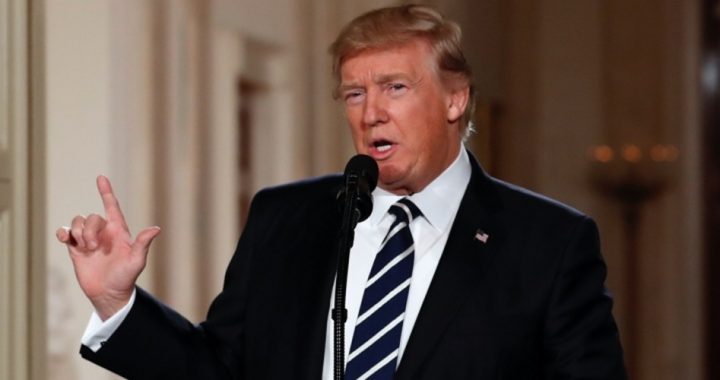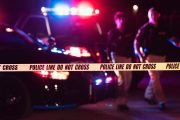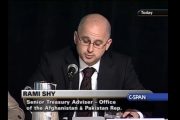
For the second time in a week, President Donald Trump expressed his dismay over the continuing and escalating gun violence in Chicago, and offered the same solution: federal assistance. At a White House conference celebrating Black History Month, Darrel Scott, senior pastor of New Revival Center in Cleveland Heights, Ohio, told the president that some of Chicago’s former gang leaders “reached out to me, because they’re associating me with you. They respect you. They believe in what you’re doing, and they want to have a sit-down about lowering [Chicago’s] body count.”
Trump responded: “I think that’s a great idea, because Chicago is totally out of control. If they’re not going to solve the problem … then we’re going to solve the problem for them, because we’re going to have to do something about Chicago, because what’s happening in Chicago should not be happening in this country.”
Last week Trump tweeted, “If Chicago doesn’t fix the horrible carnage going on … I will send in the Feds!”
According to the Chicago Sun-Times, at least 296 people have been shot so far this year, compared to 292 in January 2016. 51 of them have died, compared to 50 last year.
It remains unclear what kind of “assistance” Trump is referring to. Mayor Rahm Emanuel hopes it’s more federal agents and federal prosecution: “Send in more FBI, DEA, ATF agents. We don’t have to talk about it anymore. Just send them. Invest in law enforcement with our Police Department.… Move more FBI, DEA, ATF. They do a great job. Use the ability to prosecute gun crimes at the federal level, and maximize that potential.”
As The New American suggested in an article published last week, the solution should not rest in more federal intervention with all the attendant threats that would imply. It might have more to do with reversing the agreement that the Chicago Police Department was forced into by the American Civil Liberties Union (ACLU) in the summer of 2015. As we noted, prior to August 7, 2015, when the CPD agreed to the limits demanded by the ACLU, the annual murder rate in Chicago averaged 458 over the previous six years. In 2016, the first full year following the implementation of that agreement, the murder total in Chicago jumped to 762, an increase of 66 percent.
Under that agreement, the CPD agreed to implement “heightened” training of its 12,000 officers to ensure that they only made citizen “stops” when they had “reasonable suspicion of criminal conduct.” They were further limited to performing “Terry” stops — stop-and-frisks — only if they are reasonably suspicious that the citizen is armed and dangerous.
Harvey Grossman, legal director of the ACLU of Illinois, made it clear that he wanted CPD officers only to make “lawful investigatory” stops as a way to improve relationships with the minority community: “We think the city has agreed to a set of terms that, when implemented, will achieve not only constitutional stops but also will achieve transparency and improve community relations.”
Dean Angelo, president of Chicago’s Fraternal Order of Police, saw what was coming: “I don’t see this [agreement] as an answer to the violence. This could be a contributor to the violence.”
Prior to implementation, CPD officers were required to complete a “contact card” if they made a stop, listing the citizen’s age, address, race, any distinguishing marks or tattoos, as well as the time, location and reason for the stop. Under the ACLU mandate, those law-enforcement officers must indicate if they initiated a “Terry” stop, the reason for the frisk, and whether or not the citizen gave permission.
Then-Superintendent Garry McCarthy of the CPD knew the new mandates would interfere with legitimate police work because it would take them off their beats for lengthy periods of time, but “I acquiesced to it because, you know, I’m trying to work with [the ACLU], they’re trying to work with us.”
Now that McCarthy is no longer working for the CPD, he is freer to express his opinion about those mandates. In an interview with the New York Daily News in December, McCarthy said Chicago “has completely flipped the script where [they now] investigate police and not criminals. And as a result, [Chicago is] reaching a lawless state.”
He cited proof: The number of police stops has dropped precipitously since the ACLU agreement, from 157,000 in 2015 to 21,000 in 2016. He added: “It you just abandon all of the successful things that we do this is going to happen.”
On January 3 McCarthy pinned the blame on Black Lives Matter (BLM) for the rising level of gun violence, filling the vacuum left by law enforcement backing away for fear of retribution, punishment, or worse, if they fail to follow the new rules. On New Year’s Day, on the CATS Roundtable radio show, McCarthy said: “The simplest way to describe it is that [they] have created an environment where we have emboldened criminals [while] we are hamstringing the police.”
Is McCarthy right? Is this a setup? When police are backing off from enforcing the law and crime goes up — “out of control” — why is the solution never to reconsider reversing the ACLU mandate, but always to offer federal assistance?
Photo: AP Images
An Ivy League graduate and former investment advisor, Bob is a regular contributor to The New American magazine and blogs frequently at LightFromTheRight.com, primarily on economics and politics. He can be reached at [email protected].
Related article:
Despite Higher Bonds, Chicago Gun Violence Suspects Are Bonding Out Faster



